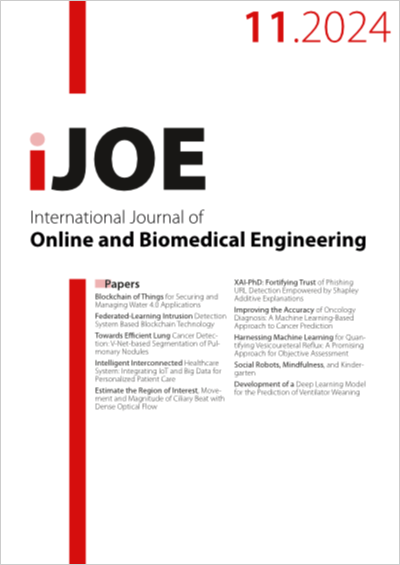Towards Efficient Lung Cancer Detection: V-Net-based Segmentation of Pulmonary Nodules
DOI:
https://doi.org/10.3991/ijoe.v20i11.49165Keywords:
Lung cancer detection, Pulmonary nodule segmentation, V-Net architecture, CT image analysis, Deep learning, Medical image processing, Early cancer detectionAbstract
The novel approach uses the V-Net architecture to segment pulmonary nodules from computed tomography (CT) scans, enhancing lung cancer detection’s efficiency. Addressing lung cancer, a major global mortality cause, underscores the urgency for improved diagnostic methods. The aim of this research is to refine segmentation, a critical step for early cancer detection. The study leverages V-Net, a three-dimensional (3D) convolutional neural network (CNN) tailored for medical image segmentation, applied to lung nodule identification. It utilizes the LUNA16 dataset, containing 888 annotated CT images, for model training and evaluation. This dataset’s variety of pulmonary conditions allows for a comprehensive method of assessment. The tailored V-Net architecture is optimized for lung nodule segmentation, with a focus on data preprocessing to elevate input image quality. Outcomes reveal significant progress in segmentation precision, achieving a loss score of 0.001 and a mIOU of 98%, setting new standards in the domain. Visuals of segmented lung nodules illustrate the method’s effectiveness, indicating a promising avenue for early lung cancer detection and potentially better patient prognoses. The study contributes significantly to enhancing lung cancer diagnostic methodologies through advanced image analysis. An improved segmentation method based on V-Net architecture surpasses current techniques and encourages further deep learning exploration in medical diagnostics.
Downloads
Published
How to Cite
Issue
Section
License
Copyright (c) 2024 Asha V, Dr. Bhavanishankar K

This work is licensed under a Creative Commons Attribution 4.0 International License.


